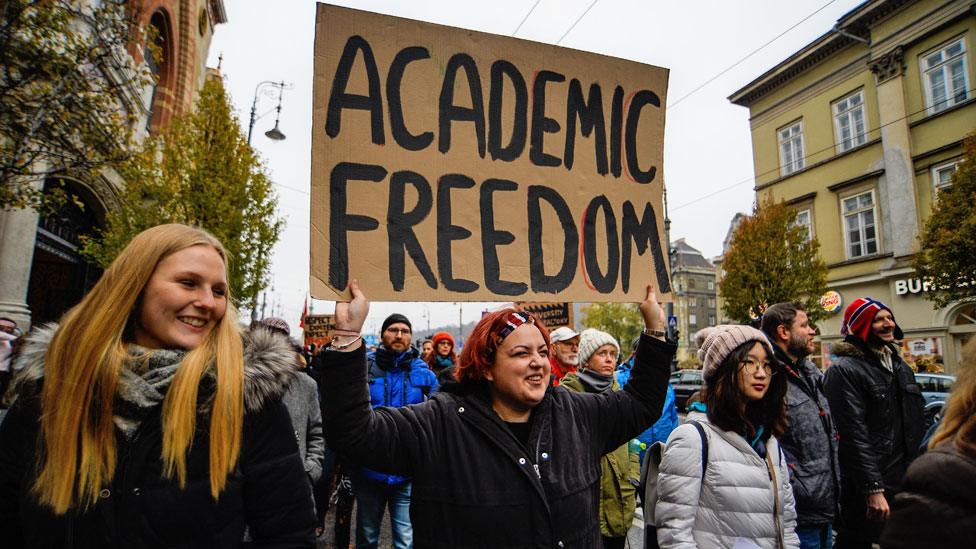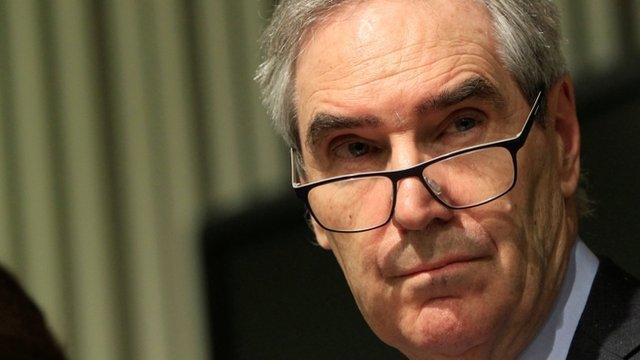West 'failed' university forced from Hungary
- Published

The Central European University is being forced to move from Hungary to Austria
The head of a university forced out of Hungary said Western governments have been "remarkably weak" in defending the right to academic freedom.
Michael Ignatieff, president of the Central European University, said it was a "scandal" that his university had been allowed to be "driven out".
The university, founded by George Soros, is having to move its courses to a new campus in Vienna in Austria.
He said the UK's representatives had said "almost nothing" in response.
"The all-absorbing question of Brexit has meant that Britain has been absent from any European debate about democratic freedom," said Mr Ignatieff, speaking at the Higher Education Festival at the University of Buckingham.
'Sinister'
After a long-running dispute with Hungary's government, the university has had to move classes from Budapest to a new site in Vienna.
The Hungarian government has rejected claims that it was an issue of academic freedom - arguing the university failed to comply with changes in higher education regulations.
"You can't have a free society without a free university system," Mr Ignatieff told an audience of higher education leaders.

Michael Ignatieff said the closure of the university was part of a "democratic recession"
The shutting down of classes in Budapest was a "scandal, absolutely unprecedented and a potentially sinister portent for the future", said the university head.
He warned of a "democratic recession" and a "battle for academic freedom in Europe" - and said the legal protections for academic freedom were "astonishingly weak".
While individual universities in the UK and in Western countries had backed the Central European University, he said that governments had failed to provide support.
He said the UK seemed more influenced by wanting to maintain post-Brexit relations with Hungary's government than to defend the principle of academic freedom.
The closure of the university had "not been a good story" for the democratic countries of the European Union, said Mr Ignatieff.
'No borders'
While they would act over their economic interests, he said they had been "remarkably weak" in their defence of values.
Universities Minister Chris Skidmore, also speaking at the festival, said he could not comment on a foreign office matter.
But he said: "I am acutely aware that as an academic community there are no borders and that we should be supporting our academic friends in all countries."
Mr Skidmore said he was keen that the UK's university sector should remain part of European research networks and exchange schemes after Brexit.
"When it comes to supporting European research and to ensuring partnerships across Europe, I'm determined to be able to make that commitment," he said.
Mr Skidmore said he felt "passionately" that the UK should maintain European links such as the Erasmus student exchange scheme, the Horizon 2020 and Horizon Europe research programmes.
On the future funding of the UK's universities, Mr Skidmore said he "wholeheartedly disagreed" with people who argued there were too many people going to university.
He also challenged an over-simplistic and "Orwellian" measure of the value of degree courses by only looking at the earnings and employment of graduates.
"It would be a sad world if we all worked for Price Waterhouse Coopers," said the minister.
- Published3 December 2018
- Published30 November 2018
- Published3 May 2017